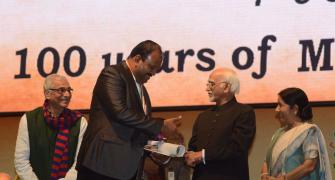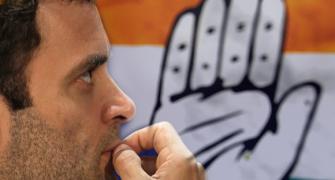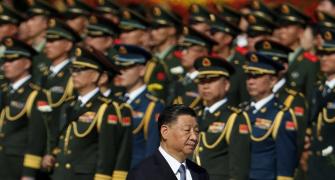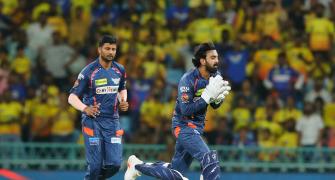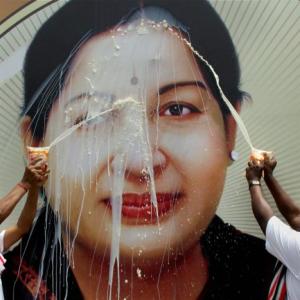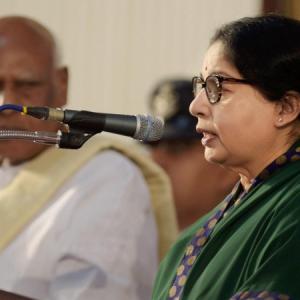
Jayalalithaa’s return as Tamil Nadu chief minister are peppered with possibilities, probabilities and problems of one kind or the other, says N Sathiya Moorthy
With her grand, gala swearing-in on Saturday, All India Anna Dravida Munnetra Kazhagam’s Jayalalithaa has matched her DMK bete noire at it for the fifth time. Her return now advances the run-up to the state assembly polls, due only in May next year, by a few months, but the question is between the two, who would beat the other to it.
There is a difference though. Karunanidhi’s five terms as chief minister in four decades -- since 1969 -- was caused by his losing assembly polls, and hence power.
There was a long drought when the late AIADMK founder, M G Ramachandran, was around. Between 1977 and 1989, the DMK under Karunanidhi could not return to power even once.
Against this, Jayalalithaa’s two swearing-ins as CM since coming to power for the first time in 1991, owed it to court acquittals from pending conviction. Both in 2001 and now in 2015, trial court convictions had dethroned her, only to be restored by appeal courts.
In the earlier TANSI land deal case, the SC after stating that she could not hold the CM’s post pending conviction, however, acquitted her in the main case.
Now, after the Karnataka high court has quashed the trial court findings in the wealth case against her, an appeal is still likely before the Supreme Court. And thereby hangs a tale.
For Jayalalithaa, the ball as they say is in Karnataka’s court. State Chief Minister Siddaramaiah of the Congress party is reported to have reiterated in Delhi that his government would decide the matter purely in legal terms -- without mixing politics with it.
Senior Congress leaders, talking to the media in Chennai and Bengaluru, have also said the same. It remains to be seen if Siddaramaiah would consult the party high command while in Delhi on a private visit.
On the morning of Jayalalithaa’s swearing-in, the media quoted Karnataka advocate-general Ravi Varma Kumar as having recommended appealing the Justice Kumaraswamy acquittal in the Supreme Court.
He has also been reported to have said there was no need for the Karnataka government to wait until the reopening of the Supreme Court after the summer recess. It could move the vacation bench, is his advice.
AG Kumar’s advice to his government may have strengthened the earlier recommendation of the special public prosecutor, also on the same lines.
The fact that the two law officers of the state government have chosen to speak their mind -- about their recommendations -- in public and through the media may hold a lot for the Siddaramaiah team, particularly in terms of the legality of the issue, on which the CM has promised to anchor his decision.
In between, the CM is also said to be under pressure from his Cabinet colleagues who hold a different view from that of the two officers.
To the extent that the Karnataka government did not ‘politicise’ the case by not seeking a stay of the HC order, the politicos may have a point.
But to extend the argument and dissuade the government (read: CM Siddaramaiah) from filing a special leave petition against Justice Kumaraswamy’s acquittal, too, may be seen as ‘political’.
Even without Karnataka, DMK’s Anbazhagan and BJP’s Subramanian Swamy have a locus standi of sorts to move the SC. But their turn would come wholly only after Karnataka, in the ordinary circumstances, had exhausted its 90-day limitation period.
Should Karnataka prefer an appeal without seeking a stay, then either or both of them may also be able to rake up the issue legally before the SC.
The AIADMK’s celebrations on amma’s return are thus peppered with possibilities, probabilities and problems of one kind or the other.
It could bolster the cadre's morale even more in an election year should the SC either refuse to interfere with the HC finding, or upholds the same after a time.
It could instead revive the tentativeness of the past seven-plus months for the party and her should SC accept a special leave petition from Karnataka and/or from Anbazhagan and/or Swamy.
It could be worse should the SC finally decide to reverse the HC verdict, whatever its reason and justification.
That could be a blow to the AIADMK on the one hand, and the end of political career for Jayalalithaa, now 67.
Point to note: These are still only in the realm of possibilities.
In between, true to form, CM Jayalalithaa could be expected to do everything possible to endear herself more to every section of the electoral constituencies in the state, through governmental initiatives of one kind or the other.
Deliberately or otherwise, an impression was allowed to gather that the relatively long, seven-month second term of stand-in chief minister, O Panneerselvam, had failed on the governance front, and no decisions were (allowed to be) taken during the period.
One gainer, however, was Panneerselvam himself. By deliberately not wanting to refer to him as ‘chief minister’ in public speeches and private references, his ministerial colleagues, party leaders and senior civil servants have helped popularise his name ‘OPS’, across the board.
To them, ‘chief minister’ meant their ‘amma’, and none else.
It’s another matter that they had hoped for Jayalalithaa to become prime minister not very long ago -- twice in two decades -- and possibly in future, too.

On the political front, the very possibility of Jayalalithaa’s return to power had silenced smaller parties in the divided Opposition craving for the chief minister’s post for their respective leaders, seemed to have concluded that they could at best aspire to share power post-poll, with the DMK leading them.
For the DMK -- which holds the record of running the state government for full five years without an absolute majority in the assembly with ‘external support’ from the Congress ally in the UPA at the Centre -- it would have to accept the reality of a post-poll coalition, even negotiating a pre-poll alliance.
The situation could change -- particularly for the ‘smaller’ parties -- only if either of the two possibilities was to happen. Either Jayalalithaa would have to lose the case in the SC, or should accept one or many of them as her electoral ally.
Going by her historic victories in 2011 (assembly) and 2014 (Lok Sabha), and unprecedented victory margins in over a decade, Jaya and the AIADMK do not require smaller allies with much lesser vote-shares than they were credited with.
The story of the two communist parties in 2014 is a case in point. The ruling BJP at the Centre cannot be any different.
Despite irresponsible media speculation about senior BJP ministers at the Centre attending the swearing-in, only a minister of state from TN, Pon Radhakrishnan, attended it, with national-level officer-bearers in L Ganesan and H Raja, joining in.
Even state BJP president, Tamizhisai Soundararajan, friend-turned-foe-turned-friend of Jaya, was kept out.
And the national media never seemed to have even attempted to find out from the leaders concerned if senior ministers like Arun Jaitley, Sushma Swaraj and Ravi Shanker Prasad were at all planning to fly down to Chennai in the first place.
It is one thing for the AIADMK extending issue-based support to the BJP-led Narendra Modi government at the Centre. The two leaders may even seek to forget their blow-hot-blow-cold relations prior to the parliamentary polls of 2014. But election issues and constituency concerns are a different kettle of fish.
Jayalalithaa would want to retain the ‘minority votes’ that she now possess, should the divided Opposition consolidates against her in the assembly polls. That would mean the BJP would have to be out of any of her electoral calculations.
Yet, Jayalalithaa and her TN government would require funding and possible clearances from the Centre for a host of projects. Independent of this, Jayalalithaa would also have to be imaginative enough to come up with new projects, be it in the private or public sector, particularly in the manufacturing sector.
It is the current trend, after the post-reforms decades of India in general and TN otherwise, moving away from manufacturing to services sector, for industrial development, job-creation and revenue accretion.
One issue that could make a difference is whatever concession the state government could give now, or later, on the liquor trade front. TN is the only state in the country where the government has monopolised liquor trade, with nearly a third of the revenue coming from its ‘TASMAC’ shops.

The Desiya Murpokku Dravida Kazhagam, Paattali Makkal Katchi and the Marumalarchi Dravida Munnetra Kazhagam, parties that are sure that they would not have to find answers, want total prohibition. The DMK has been cagey at best, knowing not how to replace liquor revenue if it were to reintroduce prohibition, after the first DMK government had given it a go-by very long ago.
Yet, any gesture, or indication by Jayalalithaa just now, that she would try to review the situation and come up with welcome answers could make a difference.
The profile of the urbanised middle class voter in the state -- now accounting for more than half of the state in every which way -- too has changed between the time Jayalalitha first became the chief minister in 1991, and full 25 years later, in 2016.
It’s more so in the case of the urbanised middle class woman voters, who had admired her for her courage in the big, bad male-dominated world of politics and public administration.
If the twitterati were to be believed, then the Karnataka HC acquittal for Jayalalithaa produced more negative responses, both from male and female voters in the state -- granting that the messages and figures were not being manipulated as much as the nation-wide ‘Rajnikanth campaign’ following the release of his multi-lingual Robot.
Rajnikanth was among the invited guests as Jaya’s swearing-in, and that was it. Two of his films have flopped in quick succession and without trace, and he does not hold any charm any more, either for film fans or for the state’s voters.
It’s again a reflection of the way things are changing in the Tamil Nadu of Jayalalithaa, Karunanidhi and Rajnikanth.
N Sathiya Moorthy, veteran journalist and political analyst, is Director, Oberver Research Foundation, Chennai Chapter.


